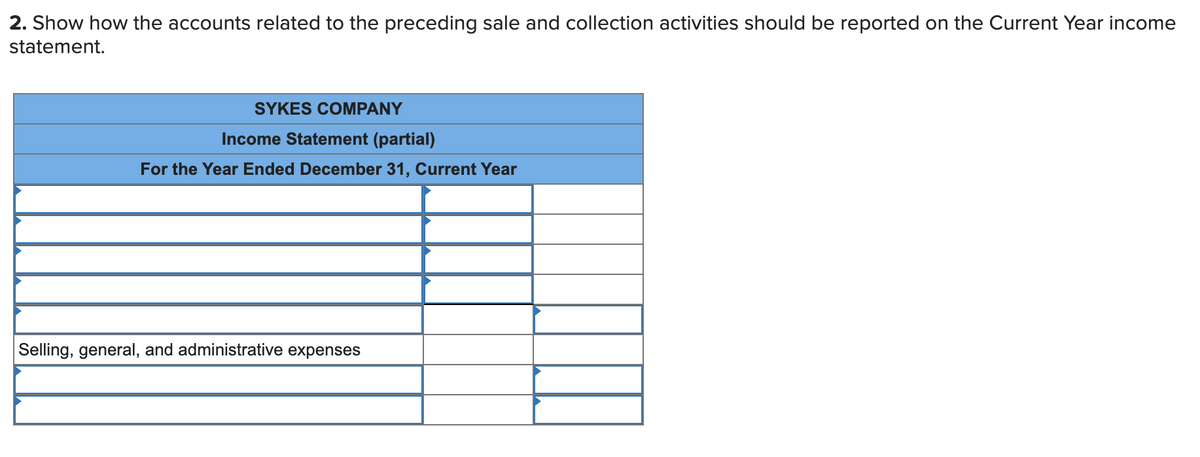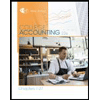[The following information applies to the questions displayed below.] The following data were selected from the records of Sykes Company for the year ended December 31, Current Year. Balances January 1, Current Year Accounts receivable (various customers) Allowance for doubtful accounts $120,000 7,000 In the following order, except for cash sales, the company sold merchandise and made collections on credit terms 3/10, n/30 (assume a unit sales price of $800 in all transactions). Transactions during current year a. Sold merchandise for cash, $272,000. b. Sold merchandise to R. Smith; invoice price, $11,500. c. Sold merchandise to K. Miller; invoice price, $48,000. d. Two days after purchase date, R. Smith returned one of the units purchased in (b) and received account credit. e. Sold merchandise to B. Sears; invoice price, $30,000. f. R. Smith paid his account in full within the discount period. g. Collected $91,000 cash from customer sales on credit in prior year, all within the discount periods. h. K. Miller paid the invoice in (c) within the discount period. i. Sold merchandise to R. Roy; invoice price, $23,500. j. Three days after paying the account in full, K. Miller returned seven defective units and received a cash refund. k. After the discount period, collected $6,000 cash an account receivable on sales in a prior year. 1. Wrote off a prior year account of $4,000 after deciding that the amount would never be collected. m. The estimated bad debt rate used by the company was 3.5 percent of credit sales net of returns. Required: 1. Prepare the journal entries for these transactions, including the write-off of the uncollectible account and the adjusting entry for estimated bad debts. Do not record cost of goods sold. Note: If no entry is required for a transaction/event, select "No journal entry required" in the first account field. Round your final answers to nearest whole dollar amount.
Bad Debts
At the end of the accounting period, a financial statement is prepared by every company, then at that time while preparing the financial statement, the company determines among its total receivable amount how much portion of receivables is collected by the company during that accounting period.
Accounts Receivable
The word “account receivable” means the payment is yet to be made for the work that is already done. Generally, each and every business sells its goods and services either in cash or in credit. So, when the goods are sold on credit account receivable arise which means the company is going to get the payment from its customer to whom the goods are sold on credit. Usually, the credit period may be for a very short period of time and in some rare cases it takes a year.
![[The following information applies to the questions displayed below.]
The following data were selected from the records of Sykes Company for the year ended December 31, Current Year.
Balances January 1, Current Year
Accounts receivable (various.
customers)
Allowance for doubtful accounts
$120,000
7,000
In the following order, except for cash sales, the company sold merchandise and made collections on credit terms 3/10,
n/30 (assume a unit sales price of $800 in all transactions).
Transactions during current year
a. Sold merchandise for cash, $272,000.
b. Sold merchandise to R. Smith; invoice price, $11,500.
c. Sold merchandise to K. Miller; invoice price, $48,000.
d. Two days after purchase date, R. Smith returned one of the units purchased in (b) and received account credit.
e. Sold merchandise to B. Sears; invoice price, $30,000.
f. R. Smith paid his account in full within the discount period.
g. Collected $91,000 cash from customer sales on credit in prior year, all within the discount periods.
h. K. Miller paid the invoice in (c) within the discount period.
i. Sold merchandise to R. Roy; invoice price, $23,500.
j. Three days after paying the account in full, K. Miller returned seven defective units and received a cash refund.
k. After the discount period, collected $6,000 cash on an account receivable on sales in a prior year.
1. Wrote off a prior year account of $4,000 after deciding that the amount would never be collected.
m. The estimated bad debt rate used by the company was 3.5 percent of credit sales net of returns.
Required:
1. Prepare the journal entries for these transactions, including the write-off of the uncollectible account and the adjusting entry for
estimated bad debts. Do not record cost of goods sold.
Note: If no entry is required for a transaction/event, select "No journal entry required" in the first account field. Round your final
answers to nearest whole dollar amount.](/v2/_next/image?url=https%3A%2F%2Fcontent.bartleby.com%2Fqna-images%2Fquestion%2F7093ecba-b133-4717-8763-cf52fea08762%2F287ab38f-1dc6-4337-ba3b-f809f6f9d75f%2F00hiusy_processed.png&w=3840&q=75)

Trending now
This is a popular solution!
Step by step
Solved in 2 steps with 6 images









